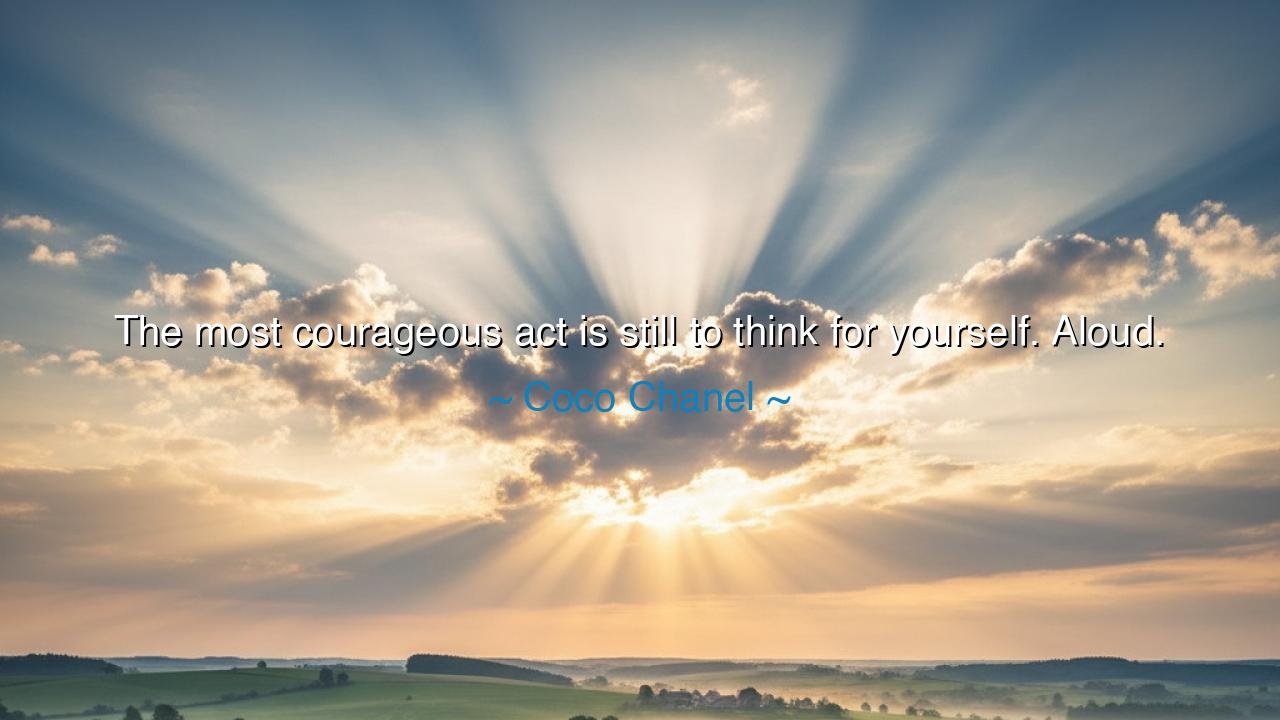
The most courageous act is still to think for yourself. Aloud.






“The most courageous act is still to think for yourself. Aloud.” Thus spoke Coco Chanel, a woman whose name became a symbol of independence, vision, and unyielding self-belief. These words, though born from the lips of a fashion designer, carry the weight of philosophy and rebellion. They are not about garments or beauty alone, but about the eternal battle for the freedom of the mind — the courage to think one’s own thoughts, and, even more daringly, to speak them before a world that demands silence and conformity. In this brief saying lies the essence of human dignity: the right to truth as one perceives it, and the valor required to give it voice.
In her time, Coco Chanel defied every convention imposed upon women. She lived in an age when society dictated not only what women should wear, but what they should think, how they should act, and how far their dreams were allowed to reach. Yet she dared to stand apart. She thought for herself — rejecting the corsets of both fabric and culture — and through her designs and her spirit, she liberated more than fashion; she liberated an attitude. Her courage was not that of the sword, but of the spirit. She wielded the weapon of individuality in a world ruled by imitation, and in doing so, she proved that the mind that dares to be its own master is the truest mark of bravery.
The ancients knew well the power and peril of independent thought. Socrates, the philosopher of Athens, walked the streets asking questions that unsettled the powerful. His only armor was reason; his only offense, truth. For daring to think aloud — for teaching others to question the false gods of convention — he was condemned to death. Yet he drank the hemlock with calm resolve, declaring that it was better to die for truth than to live in ignorance. In him, as in Chanel’s words, we see the eternal pattern: that the world often fears those who think freely, for their thoughts cannot be controlled. But it is through such souls that civilization moves forward, shaking off the dust of blind obedience.
To think for oneself is an act of creation. It demands the same fire that the gods gave Prometheus when he brought light to mankind. For when a person dares to voice what they truly believe — even when it contradicts the masses — they kindle a flame that may guide others out of darkness. But such courage is not easy. The world, since the dawn of time, has punished those who challenge its illusions. The prophets were stoned, the poets were exiled, and the reformers were burned at the stake. Yet every age that tried to silence the brave eventually learned to speak in their words. Thus, Chanel’s insight is not a call to vanity, but a call to immortality — for those who think aloud plant the seeds of tomorrow’s truth.
Consider also the story of Galileo Galilei, who gazed through his telescope and saw what others refused to see — that the Earth was not the center of the universe. For this act of intellectual defiance, he was branded a heretic. But he, too, chose courage over conformity, whispering as he was condemned, “And yet it moves.” His quiet rebellion reshaped the heavens. Like Chanel, Galileo’s voice arose not from anger, but from conviction — the unyielding belief that truth, once spoken, can never again be silenced.
To think aloud, as Chanel reminds us, is not only to speak one’s mind — it is to claim one’s identity. It is the moment when the soul ceases to borrow thoughts and begins to create its own. Such courage begins in small acts: questioning what others accept without thought, refusing to echo lies simply because they are loud, and standing firm when one’s voice trembles. Every time a person speaks the truth they have discovered, they become a torchbearer in the long procession of humanity’s awakening.
Therefore, O seeker of wisdom, take this lesson to heart: Courage is not found only in battlefields or grand deeds, but in the quiet moments when you choose honesty over approval. Do not let the world’s noise drown the voice of your conscience. Think deeply, speak truthfully, and let your words reflect the clarity of your mind and the purity of your heart. For the greatest service one can offer to mankind is not blind agreement, but authentic thought — thought that enlightens, uplifts, and inspires.
In the end, Chanel’s words are both a challenge and a promise. To think for yourself is to risk loneliness, misunderstanding, and scorn — but to do so aloud is to affirm your existence before the universe. The timid follow the echoes of others, but the courageous become the echo that others will follow. Speak, then, with integrity and conviction, for every true word spoken from the soul is an act of creation. And when you do, you will find that freedom — that most divine of gifts — begins not in the body, but in the unconquered voice of the mind.






AAdministratorAdministrator
Welcome, honored guests. Please leave a comment, we will respond soon